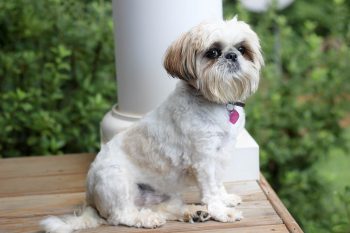While dogs are often celebrated for their loyalty and protective instincts, making them excellent guard dogs, there exists a spectrum of breeds whose characteristics and temperaments render them less suited for this particular role. Some breeds, by their size, demeanor, or simply their overwhelming friendliness, do not fit the traditional mold of a guard dog. This article explores “7 Lesser-Known Dog Breeds Who Make Terrible Guard Dogs,” delving into the reasons why these adorable canines are more likely to welcome intruders with wagging tails rather than a protective stance. From the diminutive yet charming Bichon Frise to the gentle giant that is the Irish Wolfhound, each of these breeds exemplifies qualities that, while making them poor candidates for guarding, make them exceptional companions and family pets.
1. Bichon Frise
The Bichon Frise is a small breed known for its cheerful disposition and fluffy white coat, resembling a cuddly cotton ball. Despite their alertness, Bichons are exceedingly friendly with strangers, often greeting newcomers with enthusiastic affection rather than suspicion. Their small size does not make them physically imposing, and their primary interest lies in companionship and play rather than protection. Bichons thrive on human interaction, making them excellent lap dogs and family pets. However, their inclination to socialize and lack of a guarding instinct means they’re more likely to befriend an intruder than deter one.
2. Cavalier King Charles Spaniel
The Cavalier King Charles Spaniel, with its expressive eyes and gentle nature, is another breed that falls short in the guard dog department. Cavaliers are renowned for their affectionate and accommodating temperament, seeking to please and be close to their owners. They exhibit little to no aggression and are generally welcoming to strangers, making them poor candidates for guarding duties. While they may alert their family to the presence of someone at the door, it’s usually out of excitement for a new friend rather than a warning of a potential threat. Their small size and friendly demeanor underscore their role as companion animals rather than protectors.
3. Irish Wolfhound
Despite its imposing size and historic role as a hunter of wolves, the Irish Wolfhound is a gentle giant at heart, known for its patience, kindness, and friendly nature. Irish Wolfhounds lack the territorial instincts and suspicion of strangers that characterize effective guard dogs. They are more inclined to greet an intruder with curiosity than hostility. Their towering presence may initially seem intimidating, but their docile and sociable disposition quickly reveals a pet more suited to friendship than guard duty. This breed’s emphasis on companionship and its lack of aggression makes it an unlikely candidate for home protection.
4. Shih Tzu
The Shih Tzu, originally bred as a royal companion in ancient China, is another breed that makes a poor guard dog due to its friendly and outgoing nature. These dogs are more interested in cuddles and companionship than in guarding their home. Shih Tzus are small in stature and lack the physical presence to intimidate, and their primary concern is being close to their owners. While they may offer a bark or two when someone approaches, their wagging tail soon reveals their true, friendly intentions. Shih Tzus embody the spirit of a lap dog, making them excellent family pets but ineffective as protectors.
5. Maltese
The Maltese is a breed cherished for its striking white coat and affectionate, gentle demeanor. Maltese dogs are known for their loving nature and strong attachment to their owners, qualities that make them excellent companions but poor guard dogs. They are small and lack the physicality to intimidate potential intruders. While they can be vocal, their barking is more a sign of excitement or a desire for attention than an attempt to guard their home. The Maltese’s priority is to be pampered and loved, far removed from the responsibilities of a traditional guard dog.
6. Basenji
The Basenji, often known as the “barkless dog,” is unique due to its inability to produce a typical barking sound, making it an unconventional choice for a guard dog. Although Basenjis are intelligent and independent, their quiet nature means they won’t alert their owners to intruders in the traditional manner. They are curious and reserved with strangers but lack the aggressiveness or suspicion to serve as effective guardians. Basenjis have a strong prey drive and are more focused on exploration and play than on home protection, highlighting their unsuitability for guard dog duties.
7. Papillon
The Papillon, distinguished by its butterfly-like ears and diminutive size, is a breed known for its intelligence and lively spirit. Despite their alertness, Papillons do not possess the guarding instinct. They are incredibly social, enjoying the company of humans and other animals alike. Their small size precludes them from being a physical threat to anyone, and while they may bark at new arrivals, it is usually out of excitement rather than a protective impulse. Papillons thrive on affection and engagement, preferring to perform tricks or snuggle in a warm lap over standing guard. Their eagerness to greet friends and strangers with equal enthusiasm makes them less than ideal as guard dogs but perfect as affectionate companions and family members.
The breeds mentioned in this article may not excel in the traditional guard dog role, but they each hold a special place in the hearts of their owners for other reasons. From the cuddly Bichon Frise to the sociable Papillon, these breeds prove that not all dogs need to be fierce protectors to be valued members of the family. Their friendly natures, affectionate temperaments, and joyful companionship offer something arguably more important than protection: unconditional love and happiness.
The post 7 Lesser-Known Dog Breeds Who Make Terrible Guard Dogs appeared first on iHeartDogs.com.

